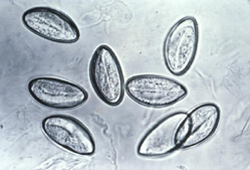Summary
Definition
History and exam
Key diagnostic factors
- perianal pruritus
- perianal erythema
- presence of worms
Other diagnostic factors
- restlessness
- insomnia
- vulvar pruritus
Risk factors
- school attendance or institutionalization
- Oral habits like nail biting or thumb sucking
Diagnostic investigations
1st investigations to order
- adhesive tape test
Treatment algorithm
symptomatic patients + family members
Contributors
Authors
Michael J. Smith, MD, MSCE

Professor of Pediatrics
Duke University School of Medicine
Durham
NC
Disclosures
MJS declares that he has no competing interests.
Acknowledgements
Dr Michael J. Smith would like to gratefully acknowledge Dr Theoklis Zaoutis, a previous contributor to this topic. TZ declares that he has no competing interests.
Peer reviewers
Randal Rockney, MD
Associate Professor of Pediatrics and Family Medicine
Department of Pediatrics
Hasbro Children's Hospital
Providence
RI
Disclosures
RR declares that he has no competing interests.
Peer reviewer acknowledgements
BMJ Best Practice topics are updated on a rolling basis in line with developments in evidence and guidance. The peer reviewers listed here have reviewed the content at least once during the history of the topic.
Disclosures
Peer reviewer affiliations and disclosures pertain to the time of the review.
References
Key articles
Kimberlin DW, Barnett ED, Lynfield R, et al, eds. Red Book: 2021-2024 report of the committee on infectious diseases. 32 nd ed. Elk Grove Village, IL: American Academy of Pediatrics; 2021 [internet publication].Full text
Centers for Disease Control and Prevention. CDC Yellow Book 2024: health information for international travel. Section 5: travel-associated infections and diseases - enterobiasis / pinworm. May 2023 [internet publication].Full text
Reference articles
A full list of sources referenced in this topic is available to users with access to all of BMJ Best Practice.

Differentials
- Inflammatory bowel disease
- Dermatitis, atopic
- Perirectal abscess
More DifferentialsGuidelines
- Yellow Book: Enterobiasis/pinworm
- Red Book: Pinworm Infection (Enterobius vermicularis)
More GuidelinesPatient information
Pinworm
More Patient informationLog in or subscribe to access all of BMJ Best Practice
Use of this content is subject to our disclaimer